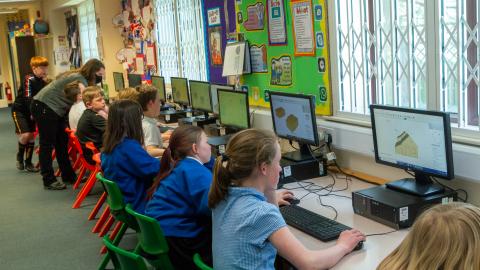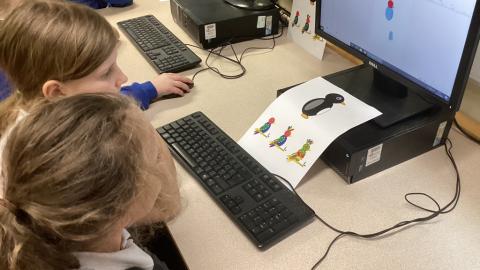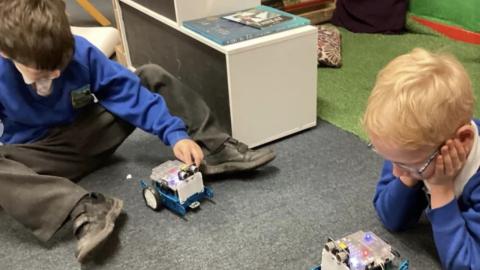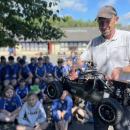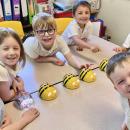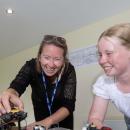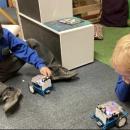INTENT, IMPLEMENTATION AND IMPACT FOR COMPUTING 2023
Vision:
Computing is an essential life skill in our ever-developing technological world. It reaches out into all aspects of our everyday lives and will play a significant role in our futures. Therefore, it is vital that our children are equipped with the Computing understanding, skills and knowledge, as well as the creativity and enthusiasm that they need in order to thrive and adapt in a world increasingly dependent on Computing. Our vision is for inspiring, engaging and progressive Computing embedded across the curriculum using a range of devices with e-safety as an integral part of teaching and learning.
Intent:
At Settle C.E Primary School our subject lead is Mrs Wright, who is our Reception teacher who liaises with the team at Kirkby Malham Primary regarding the Computer Curriculum. In our partnership we strive to deliver a high-quality computing curriculum which allows our pupils to recognise the significance of digital technology in their everyday lives. We explicitly teach pupils the skills and knowledge they need to become creative, digitally literate, computational thinkers. Our curriculum is led by key concepts, terms and vocabulary providing opportunities to build a shared and consistent understanding. Units are organised into a spiral curriculum to ensure themes are revisited regularly as pupils move through the school. This ensures each unit builds effectively on prior learning and ensures connections are made between different units to help children know more and remember more. Our pupils are able to apply and consolidate understanding as they progress through the school to enable them to become computer scientists of the future. We encourage curiosity about digital technology and encourage our pupils to ask questions about the digital systems around them. We explore how technology is used in the real world and how to use it in a safe and responsible way. We ensure all children are exposed to high-quality computing teaching and a range of learning experiences. The substantive knowledge builds progressively to develop children’s understanding of the following key concepts:
Computing systems and networks: (systems, networks and how they are used, the internet, hardware and software)
• Programming: (interpreting, creating and evaluating algorithms, programming to accomplish specific goals, detecting and correcting errors)
• Data and information: (collecting, analysing, evaluating, presenting data and information)
• Creating media: (design and development, communicating and collaborating online, evaluating online content, respectful and responsible communication, presenting, creating content)
• As part of the work on each key concept, children also explore and learn about:
• The effective use of tools
• The impact of technology
• Safety and security
We deliver a broad and balanced computing curriculum which stimulates and maintains children’s digital curiosity. Key concepts are enhanced through real-world contextual examples on to give the children a real-life understanding of the terms taught. Where possible, a focus on interdependencies with other curriculum subjects is used in lessons to give our children a deeper understanding of these concepts.
Implementation:
At Settle C.E Primary School and Kirkby Malham Primary School, we use the National Curriculum and the National Centre of Computing Excellence (NCCE) Teach Computing Curriculum as a starting point to plan inspiring and engaging Computing lessons. The NCCE Teach Computing Curriculum has been designed by experts in the Computing field and by teachers to ensure that there is clear progression and development of a range of skills and knowledge, which we feel provides our children with the progressive and engaging learning journey that they deserve. Our Computing Curriculum covers four key areas: Computer Networks and Systems, Programming, Multimedia and Data Handling. Sometimes these will be embedded with our year group topics and sometimes aspects might be taught discretely. Children will also have opportunities to develop and apply their Computing skills in other areas of the curriculum. For example, publishing their writing using Word or using the internet to research information on the Ancient Egyptians. Keeping ourselves safe online is fundamental in our digital world. We ensure that e-safety is taught explicitly as well as being continuously embedded in all areas of school life. We continuously embed the expectations set out in the Education for A Connected World Framework to ensure that pupils have a good knowledge about online safety and what they can do to help them navigate an increasingly digital world. We hope that by the time our children leave in Year 6, they leave as computer literate, confident and enthused individuals, equipped and eager to grab any opportunities that come their way in life. All children have access to the Computing curriculum with work being tailored appropriately for children with SEND. Children will learn through similar activities, with final outcomes modified to suit all needs. Children begin their computing journey as early as Nursery by exploring the various forms of technology that surround them in their environment. As they progress to Reception, pupils put their knowledge of technology into play as they create algorithms for Beebots and explore the use of an iPad. During their Summer term they are introduced to desk top computers by practising their mouse skills. From Year One, children follow the NCCE Teach Computing Curriculum to develop their core skills and ensure depth and progression. Children also use their digital knowledge to support other areas of the curriculum such as Year 2 children producing fact files about the Arctic through to children in Year 6 making their own fairgrounds using Crumble micro-computers. Children have weekly lessons in Computing throughout school. To ensure automaticity of recall knowledge in all units of work throughout the year, teachers in Y1-6 use:
• Knowledge organisers that are available to all pupils within lessons to support their current, past and future learning. Key vocabulary is accessible here at all times for pupils to check their understanding.
• Quick quizzed- These questions at the start of each lesson help to support what the children remembered from previous learning.
• The knowledge the children need to acquire has been organised around a set of key concepts which are revisited as pupils progress through the school. (See progression document)
Impact:
At Settle Primary School and Kirkby Malham Primary School, children continuously build on their knowledge in Computing helping them to remember more for longer . In order to ensure that the children’s understanding of the curriculum is progressing, the Computing subject leader and the Senior Leader Team will undertake monitoring and evaluation to ascertain the following: Teachers are aware of previous and future learning and thus pitch their lessons at an achievable level for all abilities. Knowledge organisers have been introduced to support automaticity within each unit. Teachers feel confident teaching their element of the Teach Computing Scheme and receive targeted support as required to support the wider use of devices in supporting all other areas of the curriculum. Monitoring and evaluations takes place in the form of informal drop-ins to lessons, conversations with pupils and teachers, pupil and teacher voices and evidence uploaded onto the shared drive. The successful, collaborative approach to the teaching of computing results in an engaging, high quality education that allows pupils to understand the world around them and encourages them to explore digital technology further as they leave primary school. The impact of learning is measured against the key concepts and key objectives within sequence of learning and is a measure of how much knowledge has been acquired. This may be through practical work, use of quick quiz assessments, or oral outcomes to demonstrate understanding. Where learning is not secure, additional learning takes place to address this.
Helen Wright Computing Lead (Updated January 2023)

